Egan Bernal: Promised land
Procycling's exclusive interview with Egan Bernal before the Giro d'Italia
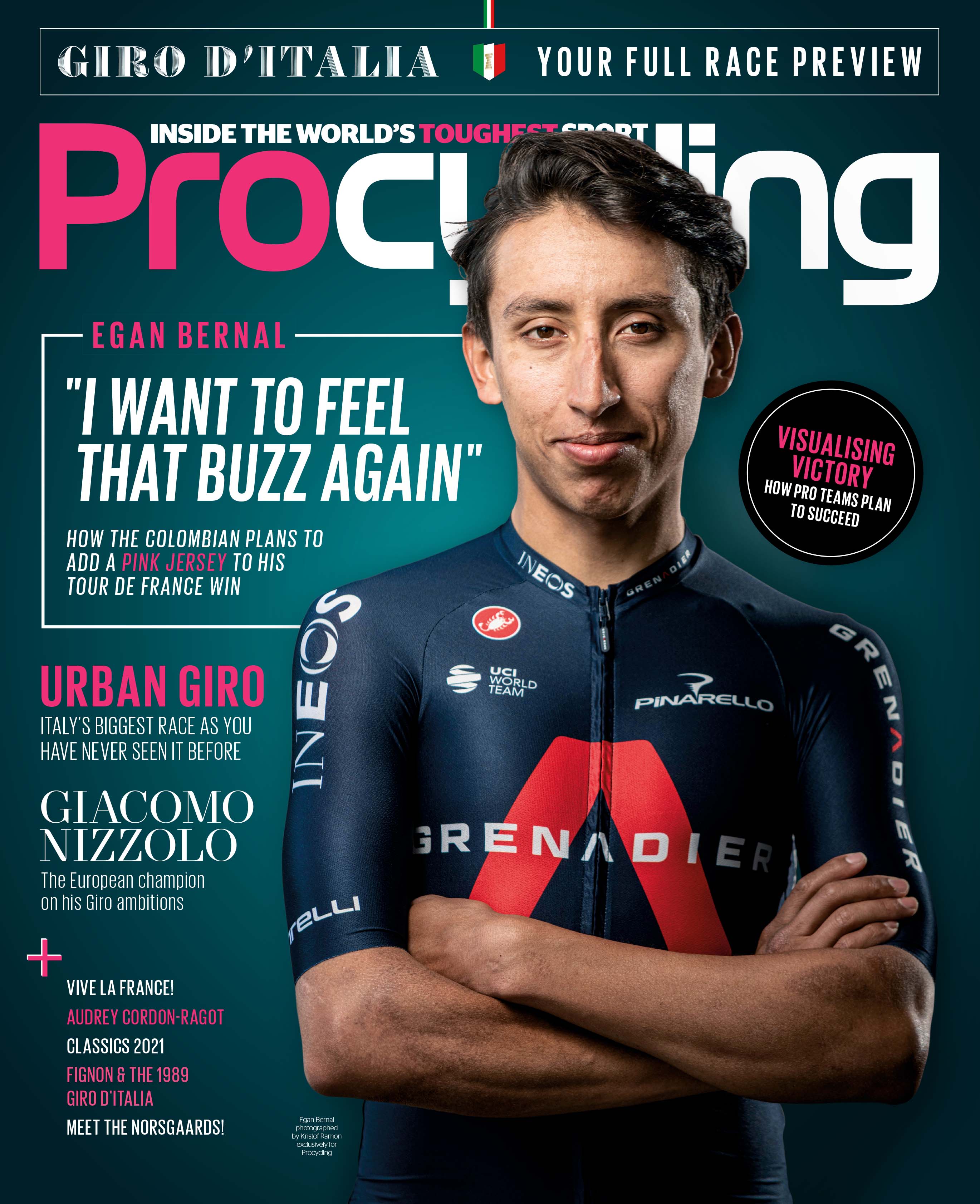
When he won the Tour de France aged just 22, Egan Bernal had the cycling world at his feet. But he looked jaded as injury ruined his 2020 title defence. Where better than Italy, he tells Procycling magazine, where he spent his first years as a pro, to rediscover his love of cycling.
This article was taken from Procycling magazine issue 281, May 2021.
Eloquence isn’t the primary attribute of a Tour de France champion, but Egan Bernal’s winner’s speech on the Champs Elysées in 2019 was a striking memory.
It lasted barely 70 seconds but was delivered in four languages: as well as his native Spanish, he muddled his way through some French and English, but the most memorable and impressive part was when he flicked effortlessly to Italian: “Thanks to Italy, because I grew up there, and I’m a bit Italian at heart,” he said.
Bernal was born in Zipaquirá in central Colombia, but, as a road racing cyclist, he was raised in Italy. A month-long stay in Sicily in 2015 rapidly led to a first professional contract, signed at the age of just 18, and the two subsequent years he spent living in Piemonte and racing for the Androni-Giocattoli team have left a lasting imprint. Together, they explain why his upcoming debut at the Giro d’Italia means so much to him.
“I have a very special feeling towards Italy,” Bernal tells Procycling. “I lived there for two years and made many great friends. Italy was where I learned how to be a cyclist and where I learned how to be an adult. Every time I race there it’s a special feeling.”
We’re talking to Bernal towards the end of Tirreno-Adriatico, where he’ll finish fourth to round out an early-season Italian block after podiums at Trofeo Laigueglia and Strade Bianche. Following a spell in Colombia, he’ll be back for the Tour of the Alps ahead of the Giro, and he may only believe it once he’s on the start line in Turin.
Get The Leadout Newsletter
The latest race content, interviews, features, reviews and expert buying guides, direct to your inbox!
“I’ve been wanting to do the Giro for a long time, but it seems something has always got in the way,” he says. “The two years I was in Androni were the two years the team wasn’t invited. In 2019 I had my crash. Something always happens.”
It’s interesting that there’s still a hint of regret about the collarbone fracture that prevented him from riding the corsa rosa in 2019, when it was initially on his race programme. He’d signed for Team Sky in 2018 and they’d brought him on steadily - he won Colombia Oro y Paz at the start of the year, and then the Tour of California in May. At the Tour, he was one of the best climbers in the race, but early time losses meant that his energies were entirely dispensed in working for Geraint Thomas and Chris Froome, first and third respectively. In 2019 the plan was to target the Giro, but his injury forced a rethink. He won the Tour de Suisse and parachuted into the Ineos Tour squad, where he hid in plain sight through most of the race, and emerged as the strongest rider in a chaotic trio of Alpine stages.
Reaching the pinnacle of the sport at 22 was a huge achievement, but it still sounds more like curse than a blessing.
“I’ve been wanting to get to the Giro as soon as possible,” Bernal insists. “This year, nothing is in the way."
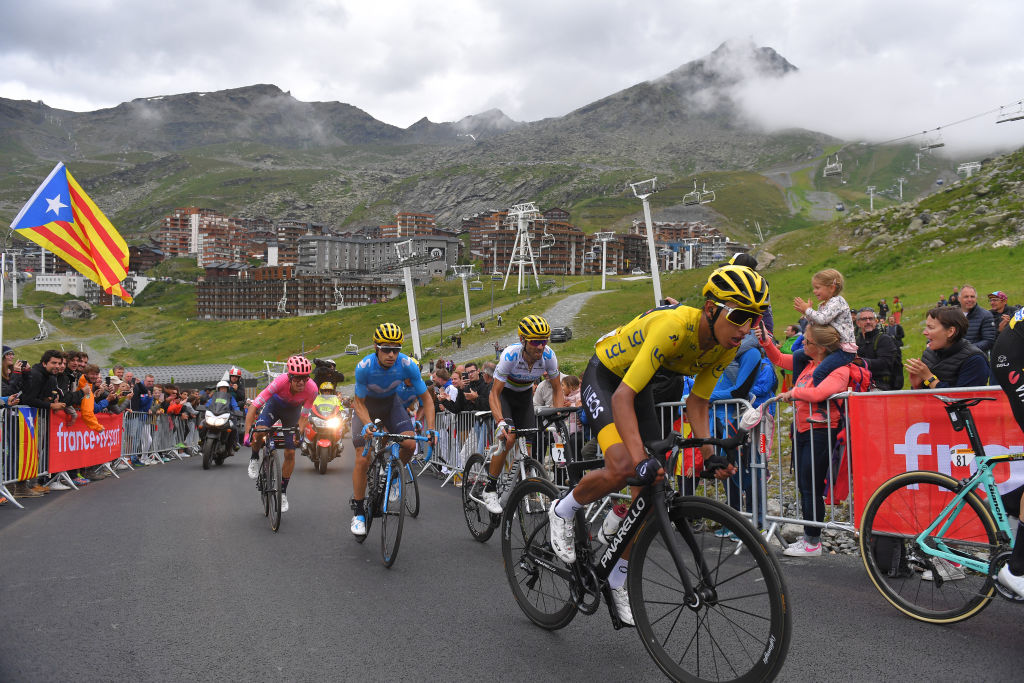
Before he hit the big time with Ineos, Bernal’s Italian journey began in August 2015, when he travelled to Europe for the junior Mountain Bike World Championships in Andorra. Andrea Bianco, an Italian coach working with the Colombian federation, phoned the former rider Paolo Alberati, who had recently qualified as an agent, and told him he had someone worth looking at. It was agreed Bernal’s return to Colombia would be delayed, and he instead landed in Sicily in the middle of the night, going on to spend a month at Alberati’s home in the shadow of Mount Etna.
As well as training on Alberati’s spare bike, Bernal would ride to the beach to swim at Lido Azzurro, and on to the markets to gather supplies for dinner.
“That was the moment I started to fall in love with Italy,” Bernal says. “It was the first time I’d spent a long period away from Colombia. Everyone was so friendly and warm. Paolo and his family were very good to me. Every encounter I had with Italian people was a positive one.”
Bernal’s athletic ability was instantly apparent to Alberati, and impossible to ignore when he took him to the mainland. A temporary foreign licence allowed for entry into three races, and Bernal won them all. One came in a race called ‘Dreaming of the Tour of Flanders’ that foreshadowed his strength on Tuscan gravel.
Alberati took him for lab testing in Perugia, where his quasi-mythical VO2 max scores come into play. It was only casually that those tests were brought up when Alberati met with Androni manager Gianni Savio at the Coppa Agostoni. He had come to pitch another rider but Savio wanted a climber, and Alberati, who had brought Bernal along for the trip, thought on his feet.
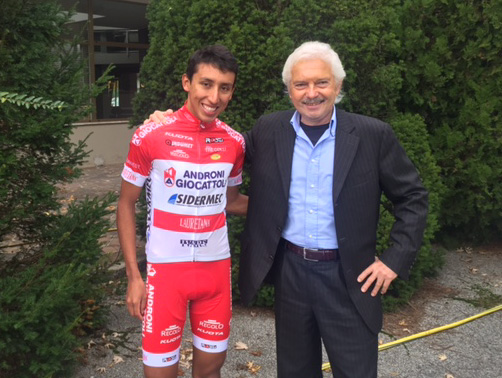
Bernal returned to Colombia with a pro contract in his hand, and he was soon on a plane back to Italy, this time on a one-way ticket. If it was love at first sight in Sicily, it was in Piemonte, in the north west of the mainland, that Bernal’s relationship with Italy blossomed.
After some teething problems during his first weeks, it was decided he should be moved closer to the Androni director Giovanni Ellena. Ellena’s friend, Massimo Giovando, was expanding his restaurant into a small hotel, and so Bernal became the first guest at Ristorante Buasca.
Giovando treated Bernal like a son, earning the nickname ‘Parcerone’ – an Italianised version of ‘parcero’, which is a Colombian term for a friend. Joining Parcerone in Bernal’s expanding social circle was ‘Paolino’ – full name Paolo Alberto – a local amateur, tasked by Ellena to show Bernal the local roads. Paolino took his duties seriously and the pair soon became inseparable. Their training group expanded to five or six regulars, who’d refer to themselves as ‘Team Buasca’.
The other key member of a close-knit group was Ellena’s friend Vladimir Chiuminatto, whose house is now painted yellow with a mural of Bernal’s face on the side – the honouring of a bet that Bernal wouldn’t let him forget.
“We quickly found ourselves together as a group, and it was a great friendship. We’d meet up for coffee, for dinner, or a walk and ice cream. We didn’t just talk about cycling; it was everything else. Those guys helped me a lot. They helped me to create a life there,” Bernal says.
“We often say it’s not that easy for young Colombians in Europe, but it’s complicated for anyone to leave everything behind and move to a different continent. Cycling is based in Europe so it’s us who have to adapt. At first it was tough – I was cold, alone, and I didn’t speak any Italian. But in the end, I don’t know, I adapted quite quickly. I met good people. I was lucky, I suppose.”
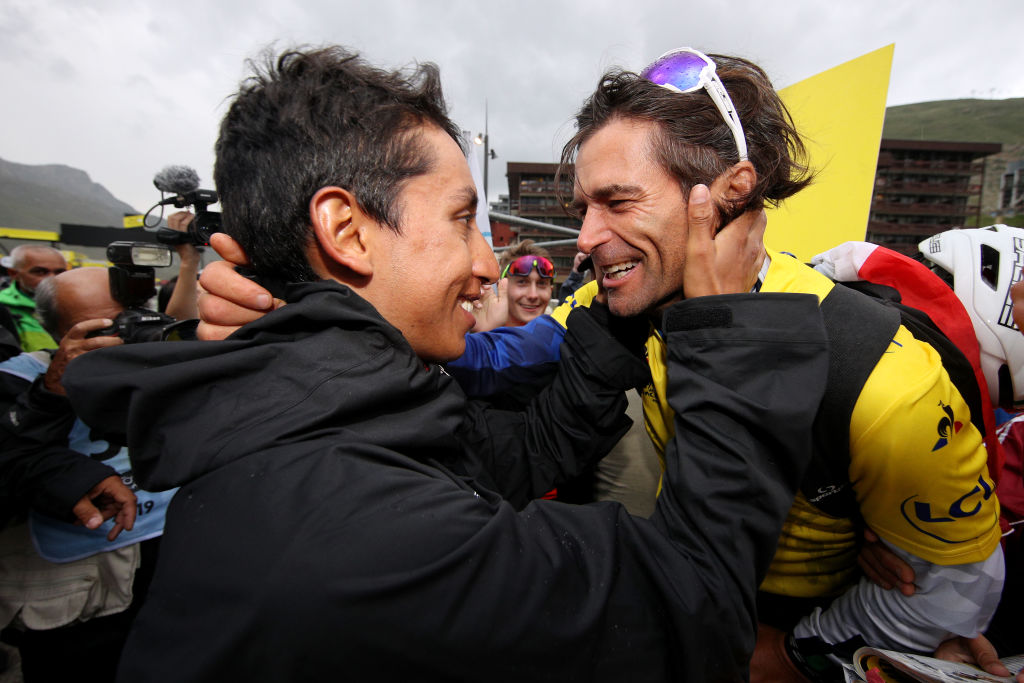
After an eye-catching first season, Bernal moved out of Ristorante Buasca and into an apartment with his girlfriend, who made the move from Colombia. Bernal, now proficient in Italian, invited Team Buasca over for Colombian meals, and his new-found freedom extended to a four-wheeled purchase. He almost crashed it into Ellena’s house when he first turned up, but insisted he was licensed to drive trucks in Colombia. The next day, when Ellena called, Bernal was at Gardaland, a theme park some 300km away.
“That’s Egan. If he wants to go to Gardaland, he goes to Gardaland,” Ellena says with a chuckle.
“Even though he was new, he was a leader in all situations. In the team, he didn’t change his mind for the older riders. With his friends, it was he who decided where to go and when.”
The Colombian’s progress in 2017 was such that he was soon picked up by Team Sky. He packed his bags and moved to Andorra, then, one yellow jersey heavier, on to Monaco. He has left a hole in Buasca, but the bond remains. The Team Buasca group chat is still going strong, as is the ‘Egan Bernal Fan Club’, which was set up when he left and now counts nearly 300 members.
A delegation was dispatched to Paris to see him win the Tour and turned up at the Sky after-party brandishing pasta di meliga – Bernal’s favourite biscuits. Security turned them away, but Bernal intervened and went on to spend much of the night with them.
“I do miss Italy,” Bernal says. “Andorra was okay actually, and I like Monaco, but what I miss about Italy is my friends.”
'I want to feel that buzz again'
Bernal’s excitement at his Giro debut runs much deeper than simply catching up with old friends. Italy appears to represent a sort of Promised Land for him – a beacon of happy memories and simpler times.
It seems perverse to think of him as a rider in need of a turnaround, given he has only just turned 24 and is already a Tour de France champion, but it has become clear that 2020 left him at sea. His yellow jersey defence crumbled on the Col de la Grand Colombier, and the injury already apparent at the Dauphiné led to a diagnosis of scoliosis, a spinal condition caused by one leg being shorter than the other.
Proclamations of a ‘Bernal era’ were barely 12 months old, but this generation suddenly belonged to Tadej Pogačar, who won the Tour at an even younger
age and in even more dramatic fashion. Professional cycling is moving at an ever-quickening rate but to rise to Tour de France champion at 22 then fall to yesterday’s news at 23 is something else.
This wasn’t just armchair talk, however. Speaking to the press in January, Ineos Grenadiers boss Dave Brailsford gave a somewhat cryptic but nevertheless strong suggestion that something had gone seriously awry.
“When he started out, he had a big smile, he was an aggressive and charismatic racer. It’s very important that he finds that joy of racing again,” Brailsford said.
We ask Bernal how he reacted to Brailsford’s comments. “I think he’s referring to the way I like to compete. I like to attack, to race on the front foot. I want to feel that buzz again, to attack without fear, to race and not worry about the result.”
But where exactly did Bernal lose all of that? It’s not like 2020 was a complete write-off. When the season resumed in August he immediately won the Route d’Occitanie with a flying attack then finished second at the Tour de l’Ain behind a flying Primož Roglic. The DNFs at the Dauphiné and Tour were significant setbacks but they seemed rooted in physical rather than psychological problems.
“I don’t know exactly… I don’t even know if I lost it totally. It’s about feeling that way again,” Bernal says.
“In the end, I was a leader pretty much straight away. I was top six at Tour Down Under, then won Colombia, second at Romandie, first at California. The next year, I won Paris-Nice and Tour de Suisse, won the Tour. Then 2020 happens.”
As Bernal explains, his rise was already a steep curve but the Tour de France naturally catapulted him into the stratosphere of superstardom at just 22. He appears level-headed and emotionally intelligent, but even the coolest customer would be knocked off balance by such a life-changing moment.
“It’s not like you’re thinking about it the whole time but I guess it did affect me,” he says. “There was about a month of not quite believing it was all real, but you’re soon plunged back into the races, so you don’t really have time to take it all in.”
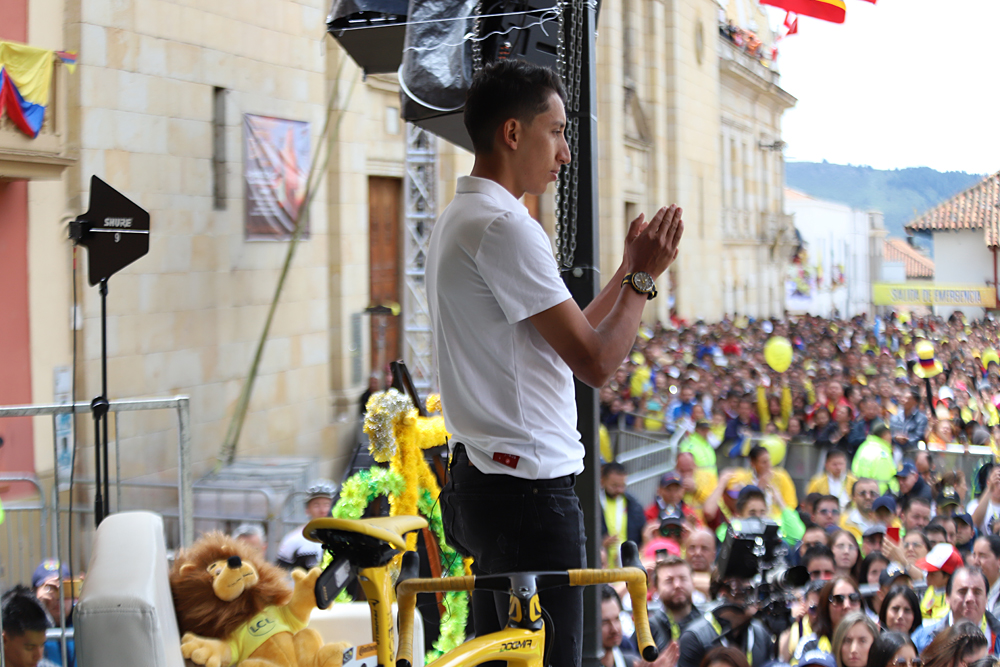
Bernal’s Giro debut can be seen as a refuge of sorts, because Italy has already been that for him in the past. Colombia idolises its sport stars and when Bernal became its first Tour champion, he barely had room to breathe. He needed a police escort to go to the supermarket, and training was useless because he could barely pedal a kilometre without being stopped for selfies.
After a while, he picked up the phone and called Ellena. “Giovanni, can I come and stay with you?” he asked.
“It was before the autumn classics. He came and stayed for a week,” Ellena says. “He saw the old gang again, and he took me out to dinner and gave me a yellow jersey, which was a special moment.”
It’s telling that Bernal called Ellena, rather than Brailsford. Ineos surely would have been able to accommodate their Tour champion, but he opted to reach out to the director of a different team. They even turned up at the Giro della Toscana in the same car.
“I think he needed to return to the old way,” Ellena says. “Not the old team, but the old country, the old people, the old training. Maybe it was something to take away the glory of the Tour de France and be the old Egan again, before all of that.”
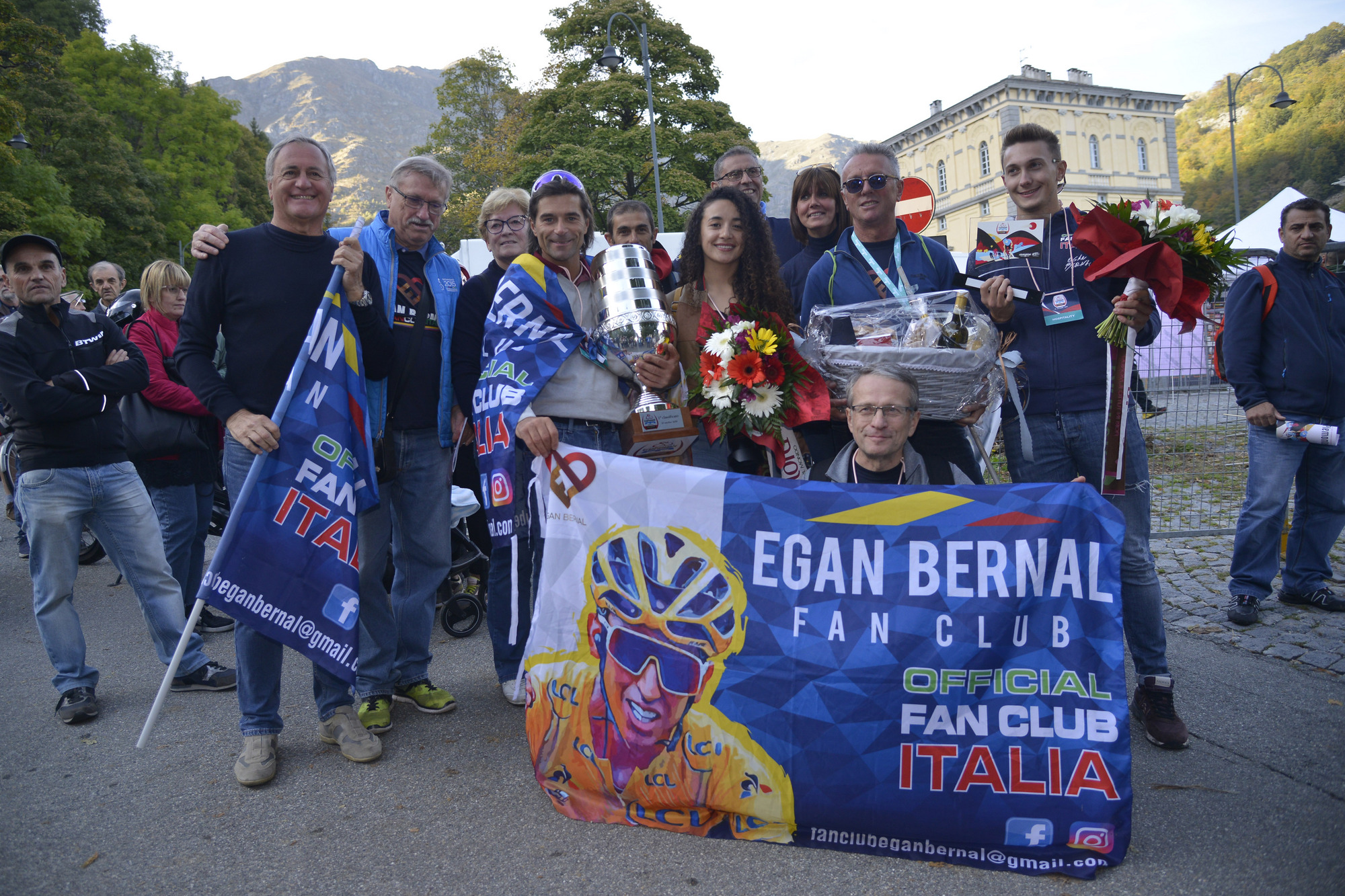
Bernal finished second in the Giro della Toscana and won Gran Piemonte on the Oropa climb before ending 2019 with a podium at Il Lombardia. That winter,
he hinted at riding the Giro in 2020 but a combination of the time trial-heavy route and his status as Tour champion made France the only realistic destination.
This time around, the route was more favourable, and the Giro was a big target anyway.
“I don’t want to fall into the trap of doing the Tour every year, and falling into the same pattern every season,” Bernal says. “The Tour is the Tour, but the Giro also exists, the Vuelta also exists. There are the Italian classics, Strade Bianche. There’s not only Paris Nice; there’s Tirreno-Adriatico. I need that variety, and to race wherever motivates me, where it comes from the heart – like the Giro.”
Bernal will line up in Turin on May 8 in a strong field that includes a host of big-name climbers put off by the Tour’s emphasis on time trialling. He’ll also be part of a strong Ineos squad, and it was interesting that Brailsford namechecked Pavel Sivakov and Daniel Martínez when discussing Ineos’s distribution of leaders across the three grand tours. Bernal’s palmarès precede him, but he wants to go to Italy unburdened.
“I don’t know what the ambition is. I don’t want to put a number on it. I just want to enjoy it,” he says. “I haven’t had any specific ambition going into these past races either. At Strade Bianche, I didn’t say I wanted to make the podium. At Tirreno, I didn’t say I want this, I want that. Obviously in this team we always have big ambitions but, for me personally, what I want is to feel that enjoyment again, to have that spark back. Whatever result comes of that, so be it.”
Part of that attitude has to do with Bernal’s back. Even if the early signs this season have been encouraging, he insists it’s an ongoing – perhaps career-long – problem to be managed.
“I’m not fully recovered,” he says. “It’s been okay but I’ve still had pain at certain points. We don’t know how the body will respond in a three-week race.In the Giro we might end up doing a stage that’s about as hard as Strade Bianche, and then have to go out and do a big mountain stage the next day. I want to be optimistic, but I just don’t know.”
The Giro will end in Milan on May 30, but you sense that for Bernal, who has yearned for this for so long and perhaps needs it now more than ever, the most meaningful destination is the start line.
Procycling magazine: the best writing and photography from inside the world's toughest sport. Pick up your copy now in all good newsagents and supermarkets, or get a Procycling subscription.
Patrick is a freelance sports writer and editor. He’s an NCTJ-accredited journalist with a bachelor’s degree in modern languages (French and Spanish). Patrick worked full-time at Cyclingnews for eight years between 2015 and 2023, latterly as Deputy Editor.
